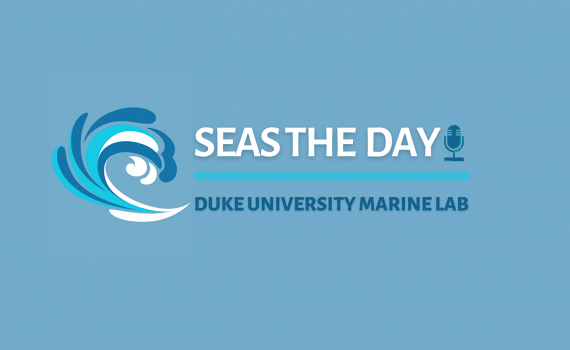In this episode, Lisa Campbell shares a story of sailing, science, and Sargassum. Based on a 3-day research cruise to the Sargasso Sea, the story was originally developed during a workshop with The Story Collider, a non-profit organization that “helps people of all walks of life -- from scientists to doctors to patients to engineers to teachers to firefighters -- tell their true, personal stories about science.” Not only did the workshop inspire this particular story, it motivated Lisa to think about podcasting as something she might do.
lcampbe@duke.edu
In this episode, Nora Ives sits down with faculty member Dr. Doug Nowacek to discuss his newly awarded Department of Energy funded WOW project, which stands for wildlife and offshore wind. Nora and Doug discuss some of the potential impacts of offshore wind on wildlife, mitigation measures, and goals of the WOW project. Part of The F-Files series.
In this episode, Bo, Victoria, and Katie tackle the controversial topic of illegal wildlife hunting, or 'poaching', and equally controversial efforts to combat it through increased militarization of protection efforts, including 'shoot-to-kill' policies. They approach the topic from a variety of angles, looking at history of the term ‘poaching’, changing attitudes to hunting over time, the role of social media, and the variety of ways governments and organizations have tried to combat illegal practices.
This episode features an interview with Duke Professor Martin Smith by The Doorstep, a podcast by the Carnegie Council for Ethics in International Affairs. Hosts Nikolas K. Gvosdev and Tatiana Serafin interviewed Marty in April 2021, on topics of fisheries sustainability, food security, and ocean governance generally. Their conversation ranges widely, from new policy initiatives of the Biden administration to old policy legacies of the cold war. It is 'on topic' for Seas the Day and we are grateful to The Doorstep for permission to republish it here . Regular listeners may remember Marty from episode 3 of Seas the Day, when he was interviewed by Kendall Jeffferys and Lauren Mariolis on the future of aquaculture.
The Convention of Biological Diversity is set to meet in October 2021 and will discuss adopting a new target of protecting 30% of the ocean by 2030. Over the last two decades, there has been a drastic increase in the number of large-scale marine protected areas (MPAs) driven mainly by international MPA targets and a “bigger is better” approach to conservation. In this episode, Megan Swanson and Sage Riddick explore how these often remote ocean spaces can still have important social impacts by looking at two cases: the Chagos Marine Protected Area and the Papahānaumokuākea Marine National Monument.
With a focus on "Memorializing the Middle Passage on the Atlantic seabed in Areas Beyond National Jurisdiction” (published in the journal of Marine Policy in October 2020), episode host, Stephanie Hillsgrove interviews two of the authors from the paper - Dr. Phillip Turner, Duke University Alumni and Dr. Cindy Van Dover, Professor of Biological Oceanography at Duke University.
In this episode, Maggie, Lily, and Savannah explore the intersections between ecotourism and Indigenous tourism. Using the lens of agency, they use specific cases to highlight how the agency of Indigenous peoples within tourism ventures varies, and with what consequences.
In this episode, Rafaella Lobo and Jessica Zhao explore the role of non-government organizations (NGOs) in promoting conservation in developing countries. They focus in particular on the role of and relations among Big International NGOs (BINGOs) and small, local NGOs, the strengths and weaknesses of each.
In this episode, Maggie, Lily, and Savannah explore the intersections between ecotourism and Indigenous tourism. Using the lens of agency, they use specific cases to highlight how the agency of Indigenous peoples within tourism ventures varies, and with what consequences.
Ecotourism has been touted as a way to limit the destruction of natural habitats caused by mass tourism, while supplementing income of local communities in developing nations. While good in theory, how successful has ecotourism been at empowering the people who live in the beautiful places ecotourists want to visit? In this podcast, Cindy Pan, Melissa Baldino, and Virginia Pan investigate the impacts of ecotourism initiatives on local communities, with the help of Duke University Marine Lab assistant professor Dr. David Gill.

